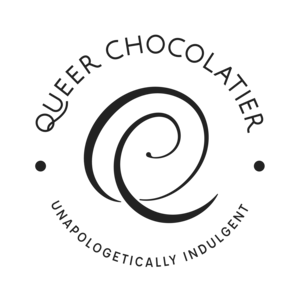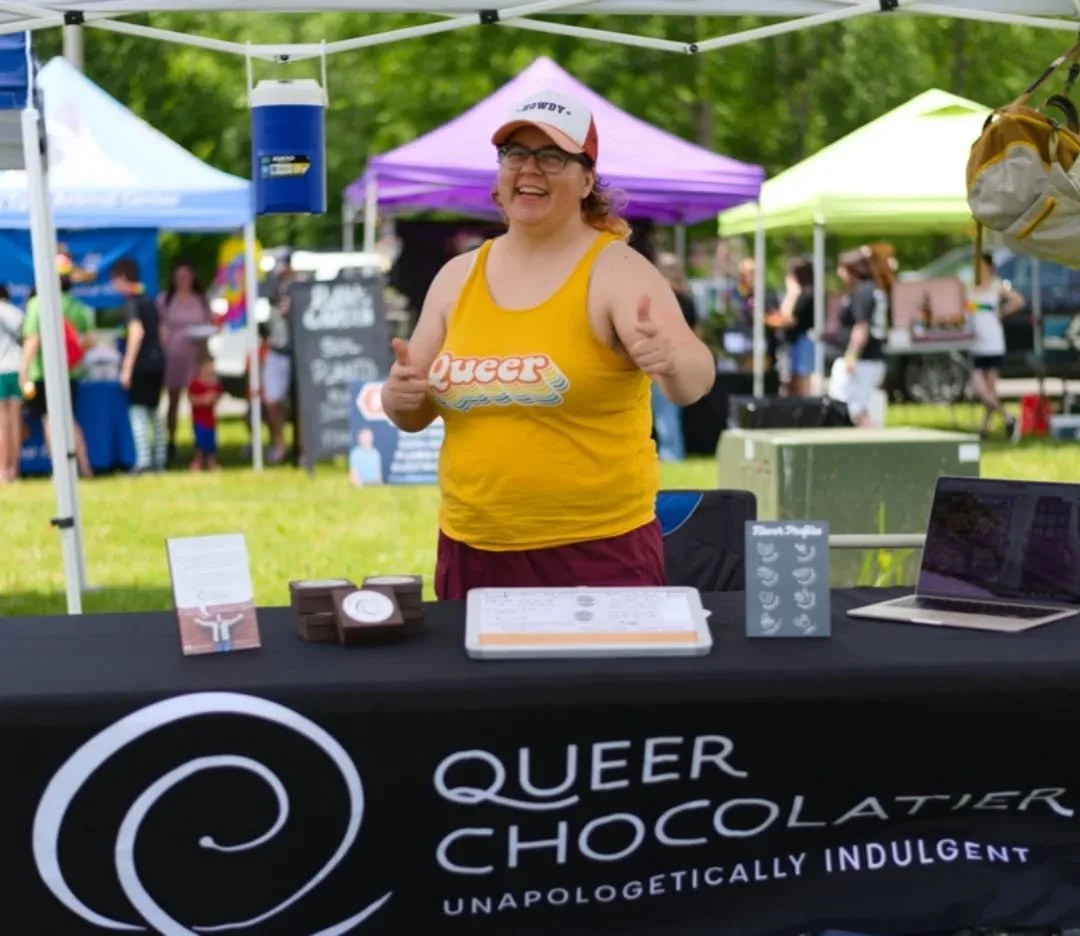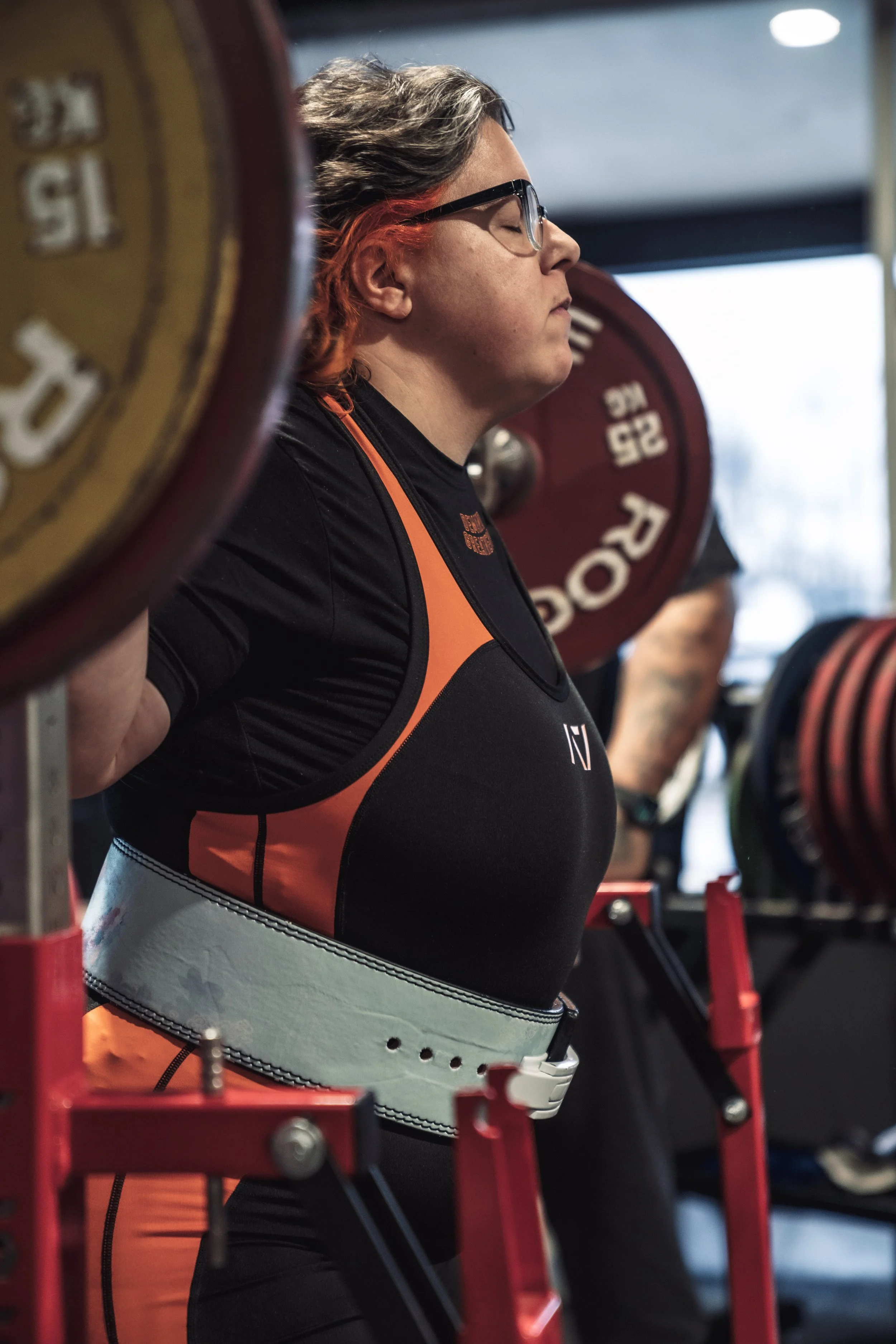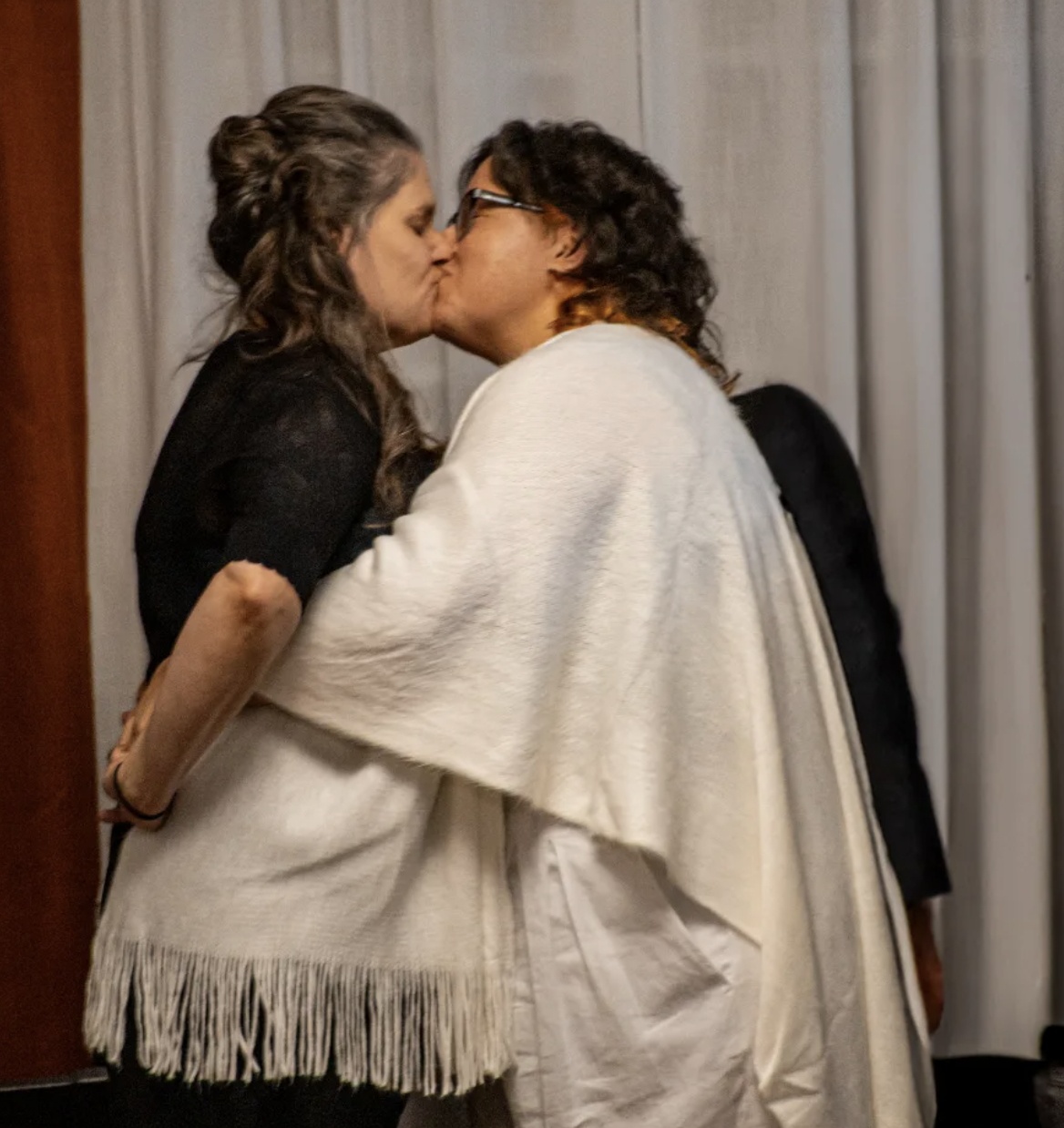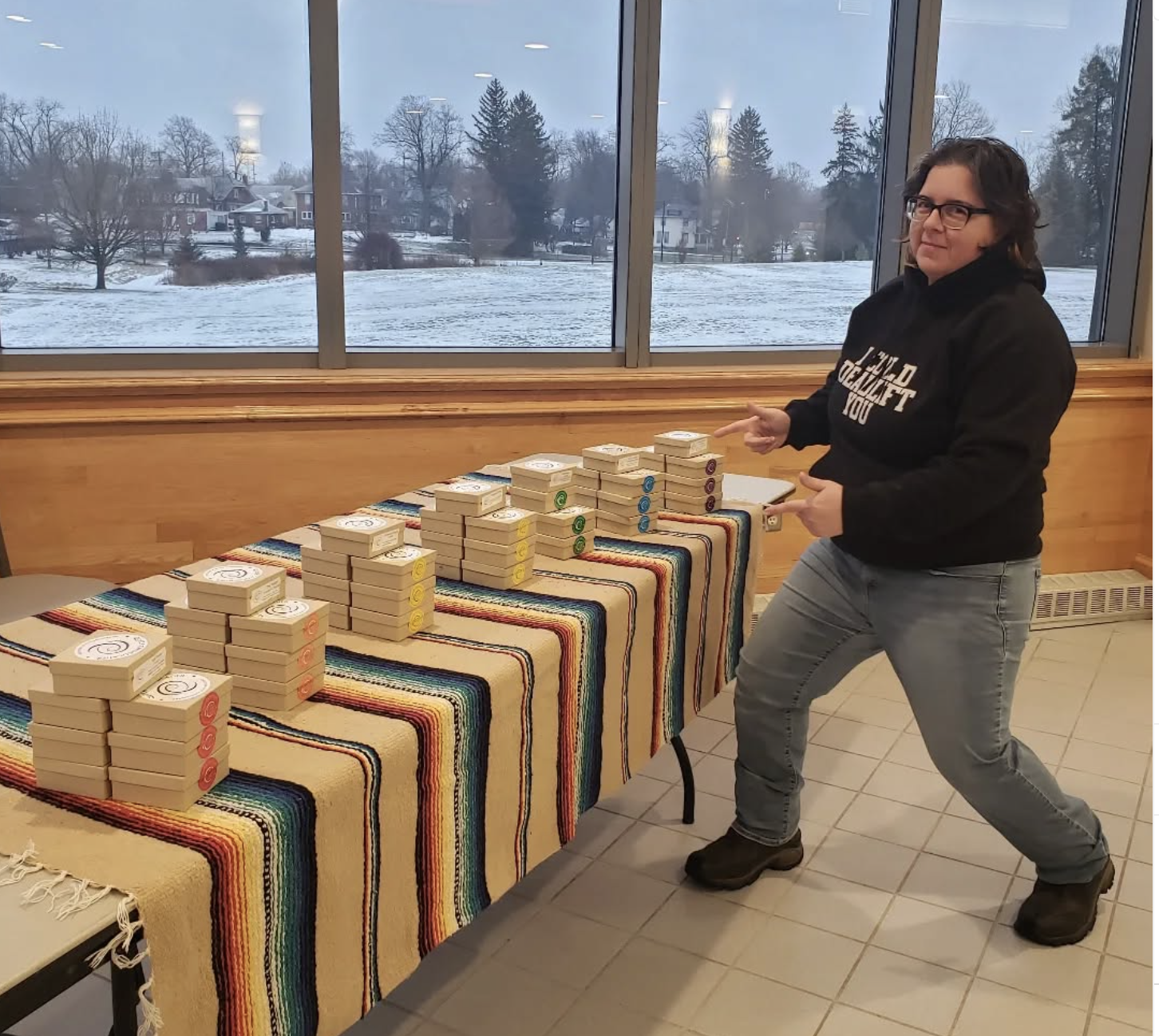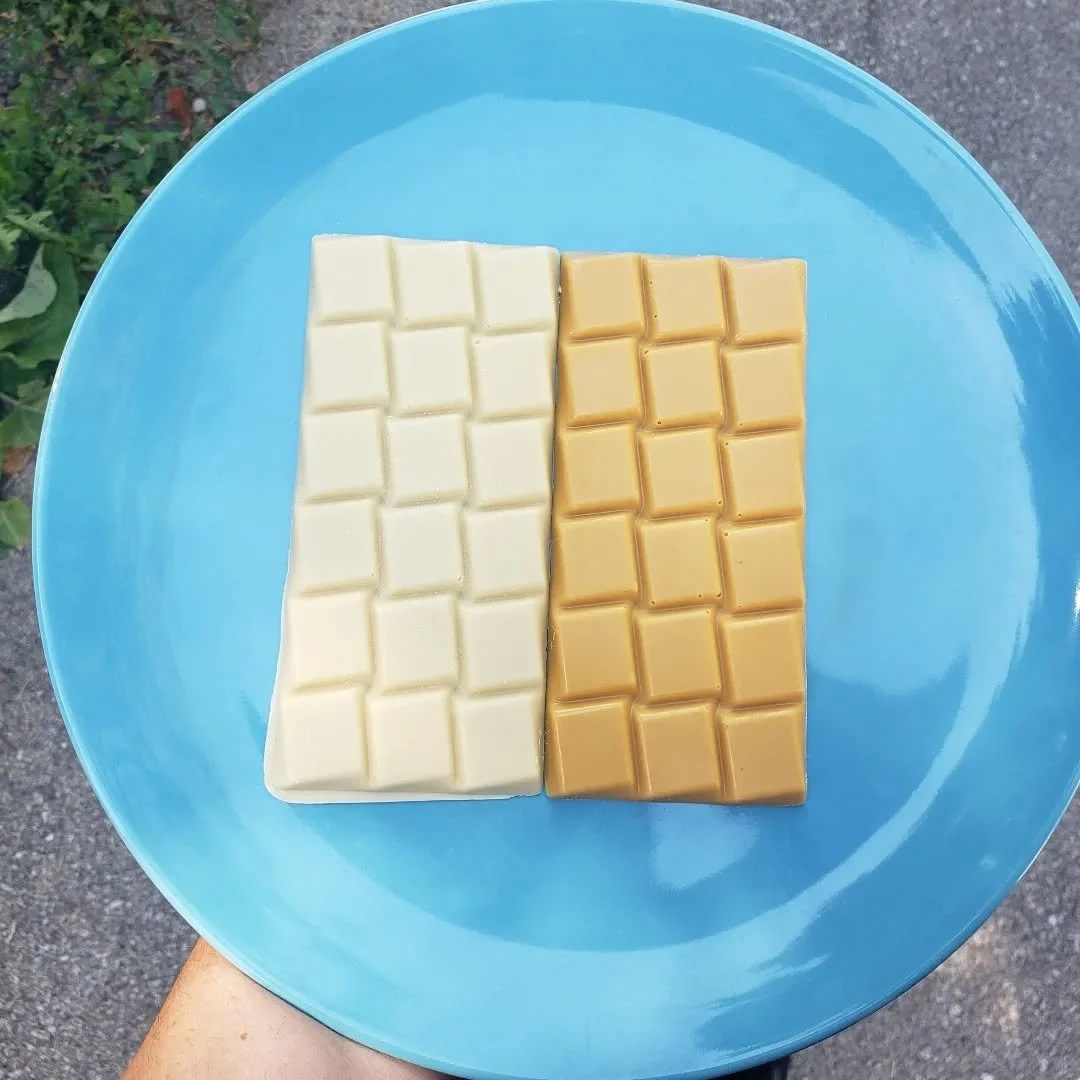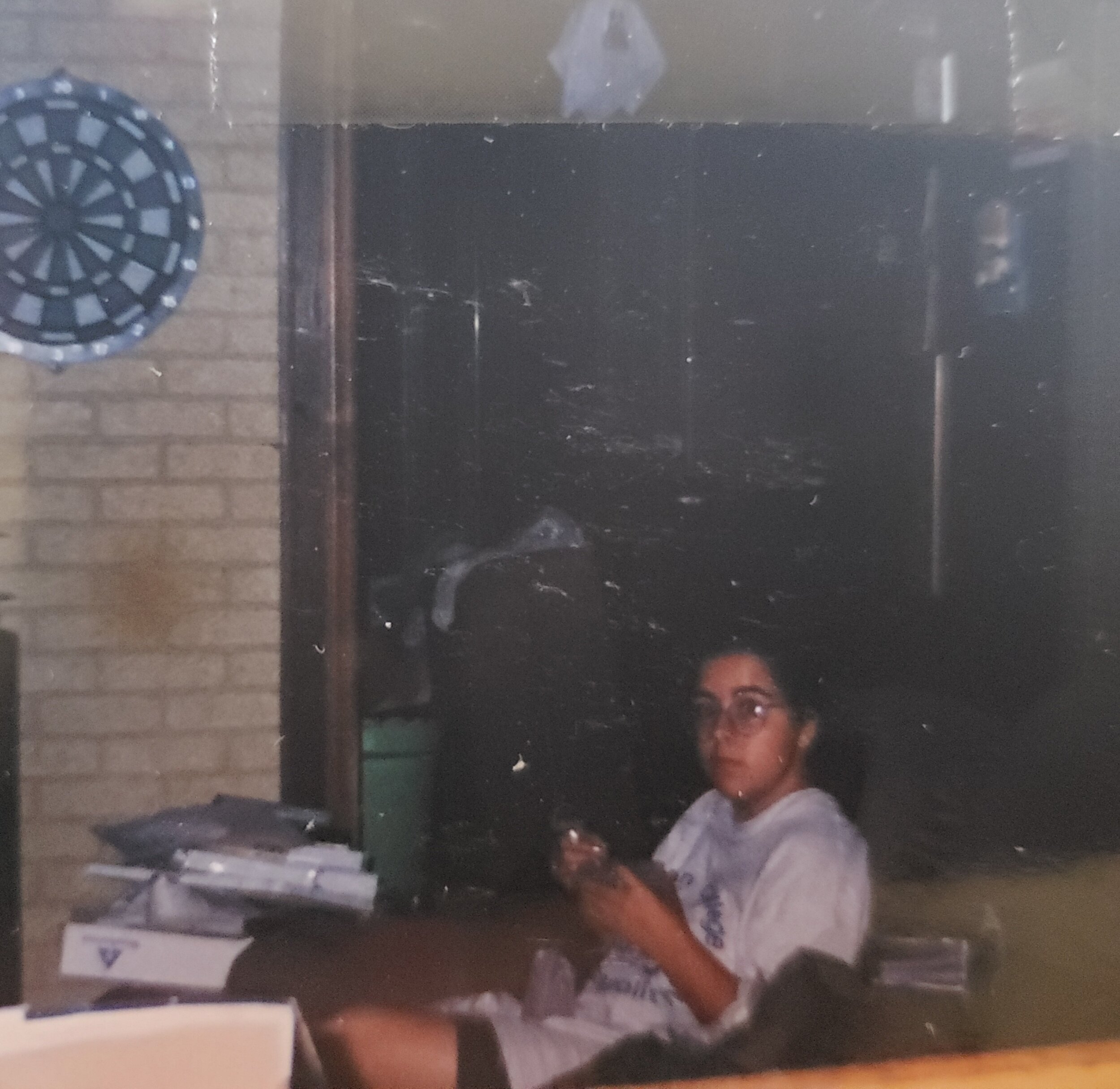It's been a looooooong time, fam!
First time vending at Hendricks County Pride but not my first time with the good ol’ bisexual finger guns!
Returning to start from Square One has been quite the endeavor!
As I dusted off the blog, I realized I hadn’t posted in over two years… 105 weeks, to be specific.
I guess it would be simple but insufficient to say that a lot has changed in that period of time.
Please allow me to ramble an overview at you:
I Started Powerlifting
I hit a PR in my squat at my first powerlifting meet in December of 2024! 125kg (275 pounds)!
As a major push to work on my physical and mental health (both of which were in bad shape in 2023), I took up powerlifting in early 2024. And when I say I took up powerlifting, I caught fire. I absolutely fell in love with the sport and set a goal to compete in a meet before my 45th birthday.
Powerlifting helped me work through a lot of mental struggles and has played a role in helping me get my Type II Diabetes under control. I got my diagnosis in late 2023 and have been working hard to change some of my lifestyle to wrangle my A1c and blood sugar. I wanted to avoid medication if I could, but that hasn’t been the case for me so I am taking an all-tools-on-the-table approach while centering physical activity such as powerlifting as my main tool.
Two days before my birthday, I competed in a powerlifting meet and I hit two personal records (squat and deadlift)!
My best bench press is 83kg (183 pounds), my best squat is 125kg (275 pounds), and my best deadlift (although it didn’t count in the meet, I did get it lifted so I count it!) is 155kg (341 pounds) which totals up to 799 pounds and is both something I am really proud of and super frustrated by since I’m just one measly pound away from the 800-pound club!
I look forward to the day I get to return to the sport and grow as an athlete.
But, it will take some time because…
I Tore My ACL
This brace was my constant companion for several weeks.
I wish I had a glamorous story to go along with this injury, and I probably could come up with a delightful heroic tale, but it would not be anywhere close to the boring and sad reality of my experiencing a slip-and-fall.
I fell in late February 2025, had surgery in May, and have been in physical therapy nearly six months now with about a week to go before I’m considered to be capable of full work duties with no restrictions.
It makes me nervous as I am not fully recovered by a long shot and I am actually really scared of how I’m going to be able to recover when my physical therapy will come to its end.
My first visit with my surgeon laid out the expectations for me as well as a choice. He let me know that humans can function without an ACL just fine. I wouldn’t be able to stop/start really quickly, or pivot super well, or do anything that requires cutting and changing directions fast.
And at the age of 45, just starting a new stage of physical fitness in my life out of not only interest but for health, I was pretty sure I needed an ACL and opted for surgery.
Having that decision made, the conversation moved toward setting expectations for recovery.
I was told that I wouldn’t feel like myself for anywhere between 9-12 months.
I understood at the time how long it would be, but understanding and feeling are not the same.
I was fairly prepared for the physical journey but I have been underprepared for the mental and emotional toll the injury and surgery have taken on my well-being. I have struggled mightily at various points along the path but there have been moments where I feel like I could rightly celebrate milestones.
And as I’m nearing the halfway mark to that yearlong recovery, I’m at another low point since it will soon be the first time I’m left to my own care without any therapy and presumably not much more follow up with my doctor either.
My lonely travels are set to get lonelier…
But I have to be clear, even though it is a lonely struggle, I have not been alone. I have had people step closer to me and gave me comfort in ways I deeply appreciate and also…
I Got Married
The moment Kathy became my wife.
I’ve known Kathy for several years now and have had the chance to call her a friend for the last few years as our circles and activities began to overlap more and more. It didn’t take long for me to develop a crush on her and I worked up the courage to ask her out on a date in the summer of 2024.
Powerlifting was a way for me to get strong enough to pick up chicks, I’d say with complete seriousness to anyone who would listen.
After our first date, I was plotting ways to physically pick up Kathy over my shoulder much to her chagrin and begrudging delight.
I was in love, what can I say?
And I’m even more in love today than any day before.
The world is a very challenging place for queer and trans folks and that weighs heavily on both of us beyond our own personal reasons as queer women. We work with marginalized populations, we volunteer and fundraise, and we sit with our community.
We got married on New Year’s Eve 2024 and while we deeply love each other, our timetable for our wedding was accelerated in no small part due to the political climate.
Who knows if same-sex marriage would come under attack? (Spoiler: we knew, every fucking queer person knew, and we are right).
But beyond same-sex marriage being vulnerable, we wanted to make sure we could align ourselves to better tackle issues our community faces such as housing and food insecurity, job discrimination, barriers to accessing evidence-based health care, all the way to harassment and violence. Kathy and I have found ways that we can do our best to help our neighbors who need help and I know that I couldn’t do as much without her as I do with her.
We aren’t stopping anytime soon, either!
I Relaunched Queer Chocolatier
After my powerlifting meet but before I trashed my ACL I was able to set up for my first farmers market in over a year.
In January of 2025, I jumped back into operating Queer Chocolatier after a year-long hiatus.
Grace Episcopal Church in Muncie was an endlessly gracious (see what I did there!?) host and shared their certified kitchen with me for many months. But ultimately, it was getting challenging for me to navigate my mental health post-divorce and find the time and energy to make chocolate and juggle a day job let alone even consider my overall well-being.
I made the choice to put QC on hold while I work on healing in all the possible ways.
It was hard and painful to pause this business because I love it so deeply. Queer Chocolatier is where I find a lot of my purpose, to the point it’s all folded back on me and has become my identity in many respects.
The grieving process of stopping my business for an indeterminate length of time was as excruciating as it was necessary. It was only right for me to grieve something that has been an integral part of who I am for the previous six years.
I missed it deeply.
But after marrying Kathy and beginning the process of joining households and merging the lives of our whole family, I began considering the hows of relaunching Queer Chocolatier.
Kathy recommended I start small by being a home-based vendor.
I have been operating as such since the beginning of this year and it has led to many wonderful moments of creation and many moments of cramped kitchen frustrations. Chocolate machines and molds cover the counters. Pantries are chock-full of chocolate or ingredients to make chocolate or packaging to hold finished chocolate.
One estimate I’ve heard a well-established craft chocolate company give for the percentage of space that should be dedicated to storage in a facility making chocolate is at least 50% and I never took it to heart until becoming a home-based vendor!
But I’m back! Queer Chocolatier is here again and still queer, which doesn’t rhyme the way another version of that phrase is more often heard, but you get me.
Over the summer and into the fall, Queer Chocolatier traveled for the first time to five different small town Pride events throughout Indiana! I’d vended before at Muncie Pride and Pendleton Pride and was happy to return to both festivities, but this year I got to go to Hendricks County Pride, Zionsville Pride, and Fishers Pride!
I also returned to my roots and have been vending at the Minnetrista Farmers Market
I Create More
My chocolate-making skills expanded and deepened this year, including making new chocolate formulas such as my Buttermilk White Chocolate and Blond White Chocolate.
The relaunching of the business has given me many opportunities to experiment with new products and learn how to make new chocolates.
I’ve started making bars with more consistency and better quality.
I’ve started making a couple of white chocolate offerings, including a Blond White Chocolate that has me very excited.
I’ve developed a Malted Milk Chocolate and an espresso-infused bar I call the Up All Night bar.
I’ve started dipping products like pretzels and Teddy Grahams in tempered chocolate for quick snacking delights. (I affectionately call the dipped Teddy Grahams “Bears in Pants” in a techno rhythm on repeat!)
I’ve also worked to improve my baking of Pain au Chocolat, Cinnamon Croissant Buns, and Scones. I’ve also launched some of the fudgy-iest brownies I’ve ever encountered.
I’ve expanded my drinking chocolate kits to closely match my bar lineup.
I’ve introduced lots of folks to Cocoa Tea, the roasted and winnowed shells of cocoa beans.
I got to partner with Tulip Tree Creamery and Pilgrimage Wine Company to pair up our chocolate, cheese, and wine offerings for a fundraising event to support the Soup Kitchen of Muncie.
All of these opportunities have been so much delicious fun!
But I’m unfortunately limited by being a home-based vendor…
I can’t wholesale or distribute and I can’t retail outside of my home state of Indiana and I know that some of you who may be reading this are not in Indiana so it makes it difficult to get my products to you.
Maybe I can return to a certified kitchen or, dreamily, a manufacturing space with a retail cafe again, but I’m in no rush as I don’t want to overextend my capacity (which is already limited with the day job and a recovering knee).
Even with limitations, though, and even with a long delay, I’m very happy and proud to say that I’m back!
Queer Chocolatier is remaining unapologetically indulgent with yet another pivot in a long series of pivots!
And if you’ve made it this long in reading this post, I want to thank you for continually showing up and sticking by my side! I appreciate you more than I can express.
It really has been a long time, y’all!
I hope I can be a part of your holiday celebrations and gift-giving moments, even while things are hard everywhere. Let me know how I can bring you a little bit of joy in the dark stretches and let me know how I can be in solidarity with you in the difficult era we are in.
Lots of love from me to you!
